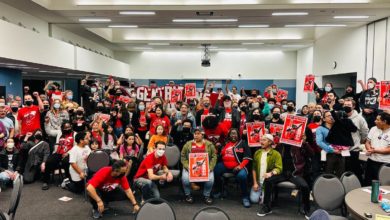A wave of “anti-piracy” bills, like the Stop Online Piracy Act, Protect Intellectual Property Act and Anti-Counterfeiting Trade Agreement, have been introduced in Congress over the past few months. These bills were not designed with input from Internet specialists, consumers or organizations that provide online services, but instead were drafted by politicians on behalf of capitalist interests that stand to profit from their passage.
On paper, the purpose of these bills is to curtail domestic and international “piracy,” which is said to be a threat to e-commerce. In reality, the bills are being pushed by bought-off politicians and demanded by corporations with vicious attack-dog lawyers to enable unprecedented prosecution of individuals and organizations who are considered to “engage in, enable or facilitate” copyright or patent infringement as defined in these bills.
Nobody wants these bills aside from their obvious supporters and backers. Many companies that provide Internet services came out in opposition to SOPA, even going as far as to black out their websites on Jan. 18, a day of online protest. Domestic and international Internet users created petitions, videos, music and interactive games in order to spread awareness of and promote popular opposition to the toxic legislation.
But what is it that makes these anti-piracy bills so bad?
First and foremost, the idea that anyone could be prosecuted and fined or imprisoned for distributing popular media and information is absurd. Piracy is the label pinned on users who post media that contains any copyrighted material, even if it is information that would otherwise not be available on the Internet or from other sources. This is an affront to our civil rights at the behest of corporate interests.
Second, the legal actions taken to protect these copyrights does not benefit the creators of that content. While the makers of entertaining and/or informative media deserve credit and recognition for their work and deserve to be compensated fairly and equitably for the work they do, over-vigilant defense of “intellectual property” simply adds to the bottom line of the corporations who claim ownership of that property.
Third, these bills will not stop piracy. The provisions of these bills are meant to target piracy but instead offer over-arching solutions that can be gotten around. For example, blocking websites based on their domain names alone is an action that could have been taken as a result of the anti-piracy legislation. However, this would not prevent users from accessing the website by simply going to the IP (Internet Protocol) address for that site directly.
Nothing about these bills supports the individuals and teams who create content. Instead, they serve as a tool to advance capitalist interests by making it much easier to target individuals and organizations with legal attacks and prosecution for breaching the repressive and reactionary laws.
Progressive people should oppose all toxic anti-piracy legislation. The program of the Party for Socialism and Liberation specifies that under a new government of working and poor people, there shall be “no patents, trade marks, copyrights or private profit from social knowledge and materials.”




